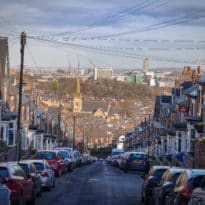House prices reached record highs in May, according to the latest Halifax house price index.
The average house price rose more than £3,000 month-on-month to £261,743. It comes as annual house price inflation reached its strongest level in nearly seven years, with prices having increased 9.5% annually.
All UK regions bar the North East saw a rise in year-on-year house price inflation last month, with the strongest growth recorded in Wales where prices have jumped 11.9% over the past year.
The South of England lagged behind, particularly in Greater London where average prices rose 3.1% year-on-year. Halifax said the softer figures likely reflect a shift in preferences for properties with more space post-Covid.
Russell Galley, managing director at Halifax, said activity continues to be boosted by the government’s stamp duty holiday, with buyers racing to complete purchases before the end of June deadline after which there will be a phased return to full rates.
Galley said: “For some homebuyers, lockdown restrictions have also resulted in an unexpected build-up of savings, which can now be deployed to fund bigger deposits for bigger properties, potentially pushing property prices even higher.
“Whilst these effects will be temporary, the current strength in house prices also points to a deeper and long-lasting change as buyer preferences shift in anticipation of new, post-pandemic lifestyles – as greater demand for larger properties with more space might warrant an increased willingness to spend a higher proportion of income on housing.
“These trends, coupled with growing confidence in a more rapid recovery in economic activity if restrictions continue to be eased, are likely to support house prices for some time to come, particularly given the continued shortage of properties for sale.”
Industry experts expect prices to remain buoyant going forward, driven by supply/demand dynamics.
Corey Whelen, director of Cambridgeshire Money, said: “I don’t see the market as a bubble that is going to pop as there are still a lot of people out there who want to buy homes, the availability of mortgages at higher loan-to-values is improving, and there’s a drastic lack of stock. The balance of power continues to favour sellers.”
George Franks, co-founder of Radstock Property, said that although the second half of May and first week of June have been quieter, a lack of supply will help the market.
“Buyers now appear to be waiting to see what happens to the market after the end of June, possible in the hope that prices will start to fall. This is especially the case in the sub-£800k bracket. It might take a few months to see how things pan out from July onwards. It will not be as simple as reducing asking prices, or indeed offers, by £15,000, as the Stamp Duty holiday was about sentiment as much as money and the fundamentals remain strong.
“I don’t believe the property market is in a bubble, but it has certainly benefited from Government meddling in the form of the Stamp Duty holiday and mortgage guarantee scheme. We’ve effectively had two years rolled into one due to Government intervention. Looking forward, the fundamentals have not changed, namely money is cheap, it’s still cheaper to own than to rent and there is a profound lack of stock.”
Andrew Montlake, managing director of Coreco, commented: “The future of the property market, in the short to medium term, will be inextricably linked to our post-pandemic lifestyles.
“The pandemic has thrown the ‘location, location, location’ mantra that applied to the property market for so long into the dustbin of history. In the short-term, the Government’s mortgage guarantee scheme will continue to support demand among first-time buyers, and this will ripple up through the market and maintain a certain level of transactions. We’re not expecting a material fall in prices in the short- to medium-term, as supply is so low and money cheap, but a minor correction may be on the cards.”





























